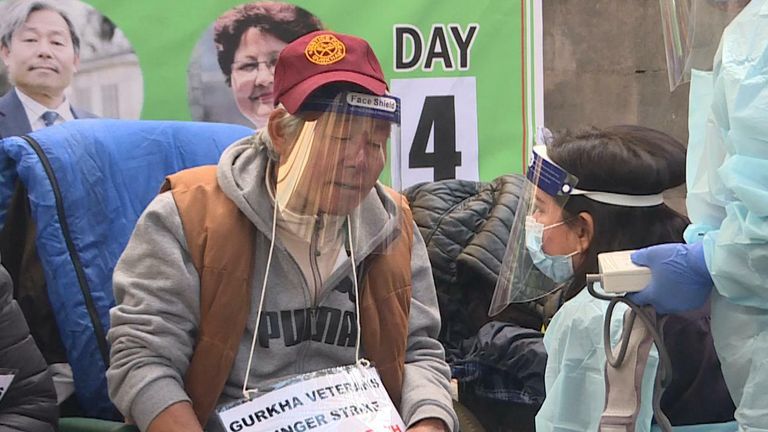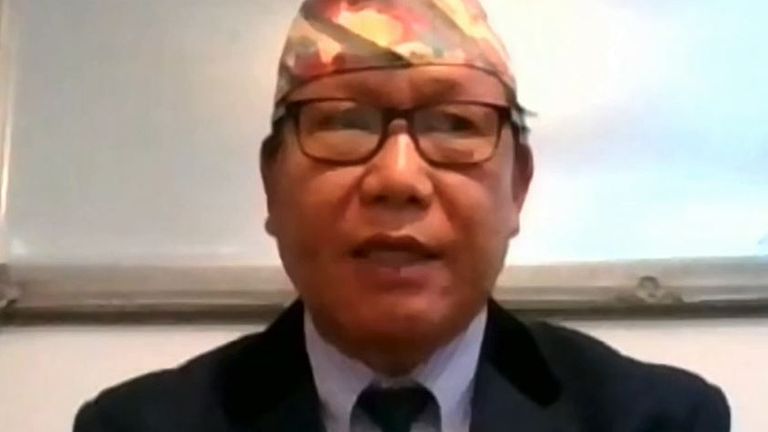The defence secretary has told Sky News he is “happy to meet with any Gurkha”, as former soldiers continue to stage a hunger strike opposite Downing Street over their pensions.
But in a sign that the government will not meet the demands of the protesters who have been camped on Whitehall for seven days, Ben Wallace said no government “of any colour” had made retrospective changes to pensions similar to the ones the Gurkhas are calling for.
“I am very happy to meet any Gurkha. My father fought alongside the Gurkhas in Malaya in the 1950s, it is a pretty remarkable group of people,” Mr Wallace told Kay Burley.
“The group of people currently protesting are groups affected by the change by the Labour government in 1997 to 2003. This was about people who are under a 1947 pension, it is a very small group of Gurkha pensioners, they had different advantages in their pension scheme in that old scheme.
“That scheme said that you got it after 15 years when a British soldier got it after 22, but there is a difference and they feel that difference needs to be made up.
“That is not the same as the Gurkhas of today or the Gurkhas after 2003, they get exactly the same pensions as British serving personnel, but of course no government of any colour, Labour or Conservative, or coalition, has ever retrospectively changed pensions, that has not been the case.”
Gurkhas are Nepalese-born soldiers who have been recruited into the British army since 1815, fighting most recently in Iraq, Afghanistan and the former Yugoslavia.
The soldiers were first recruited by colonial rulers in India in the 19th century as a “martial race” known for their bravery.
In 2009, following a campaign supported by the actress Joanna Lumley, all veterans who retired before 1997 with at least four years of service were allowed to settle in the UK.
According to the Support Our Gurkhas website, the hunger strikers are campaigning for equal pensions for Gurkhas who retired before 1997 and are not eligible for a full UK Armed Forces pension.
Gurkhas who served from 1948 to 2007 were members of the Gurkha Pension Scheme (GPS).
This was closed in 2007 and all serving Gurkhas or those who retired after 1 July 1997 were given the option of transferring to the Armed Forces Pension Scheme (AFPS).
The date 1 July 1997 is when the Gurkhas became based in the UK and no longer classified as a Far East-based force.
Under the GPS, Gurkhas qualify for an immediate pension after 15 years of service, while for armed forces as a whole it is 22 years.
This can mean some Gurkhas will have been receiving pension payments for more than 20 years before many British soldiers of the same rank and length of service qualify for payments as part of the AFPS.
The GPS was based on the Indian Army model and was designed for Gurkhas retiring back to Nepal, where the cost of living is much lower than in the UK.
However, many of those Gurkhas will have taken up the right to settle in the UK following the change of policy under the Labour government in 2009.
Pensions under the GPS were increased by between 10% and 34% in 2019, while £25m was invested in medical and healthcare facilities in Nepal for Gurkha veterans.
A public consultation on the latest changes to the scheme ended in March and the government is currently considering the size of the uplift that will be applied to the pensions.
The issue has been the subject of long-running campaigning over the years.
Responding to calls for reform in 2010, Labour defence minister Kevan Jones described the GPS as “good and fair” and said the MoD’s position on the matter was “legally and morally sound and beyond reproach”.
The exclusion of Gurkhas who served before 1 July 1997 has also been challenged in the courts, with the European Court of Human Rights ruling in 2016 that the move was “objectively and reasonably justified”.
Labour’s shadow defence minister Stephen Morgan wrote to Mr Wallace on Wednesday, urging him to “engage constructively” with the Gurkhas.
He added: “I would urge you to meet with these veterans, as I have in the past and will do so again this week. No veteran of the British Army should have to resort to a hunger strike to be heard.”
On Tuesday, officers from the Metropolitan Police took down a gazebo set up by the protesters.
Speaking about the incident, Commissioner Dame Cressida Dick said bylaws for the area opposite Number 10 “do not allow for what might become a permanent encampment”.
She said officers were “extremely polite” and “extremely professional” and had done “the right thing” by removing the gazebo, adding that she has “a massive amount of respect” for the Gurkhas.







